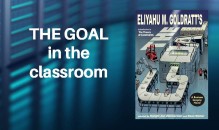North River Press is the exclusive U.S. publisher of books by Dr. Eliyahu M. Goldratt. We also publish titles related to Dr. Goldratt’s Theory of Constraints, and other business books. (Click here to browse Goldratt Books titles.)
The Theory of Constraints (TOC) is an overall philosophy developed by Dr. Eliyahu M. Goldratt, usually applied to running and improving an organization. TOC consists of Problem Solving and Management/Decision-Making Tools called the Thinking Processes (TP). TOC is applied to logically and systematically answer these three questions essential to any process of ongoing improvement:
- “What to change?”
- “To what to change?”
- “How to cause the change?”
More specific uses of the Thinking Processes can be used to significantly enhance vital management skills, such as:
- win-win conflict resolution
- effective communication
- team building skills
- delegation
- empowerment
Famous for spectacular results, the use of TOC has resulted in Proven Solutions created by applying the Thinking Processes (TP) in specific functional areas such as Sales, Marketing, Logistics, Finance, Accounting, Engineering and Project Management. Many of these solutions are discussed in detail in the books: The Goal, The Race, It’s Not Luck and Critical Chain.
TOC recognizes that the output of any system that consists of multiple steps where the output of one step depends on the output of one or more previous steps will be limited (or constrained) by the least productive steps. In other words, as paraphrased in The Goal, the strength of any chain is dependant upon its weakest link.
Where manufacturing is concerned, TOC postulates that the goal is to make (more) money. It describes three avenues to this goal:
- Increase Throughput
- Reduce Inventory
- Reduce Operating Expense
As Dr. Goldratt noted, the opportunities to make more money through reductions in inventory and operating expense are limited by zero. The opportunities to make more money by increasing Throughput, on the other hand, are unlimited.






